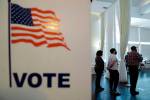Time to re-examine Nevada’s caucus system
On Feb. 20, voters made their voices heard in the Democratic presidential race at precinct caucuses across Nevada, many of them for the first time. The contest between Hillary Clinton and Bernie Sanders was energetic and hard-fought, a clear reminder of why the country needs an early state with Nevada’s demographic, regional and cultural diversity.
But despite the substantial innovations the Nevada State Democratic Party incorporated this year, the caucus process remains difficult for too many people. The neighborhood meeting format may have made sense in an earlier time, but it simply doesn’t make as much sense today.
We sought out input over the past two months, and we’re listening. Long lines and technological mishaps are not acceptable, and they turn voters off from taking part in an important civic duty.
But before we look at how we can improve things in future elections, let’s remember how we got here in the first place.
Nevada has actually been a presidential caucus state by statute since 1981. When Nevada and South Carolina were formally moved up on the presidential calendar for the 2008 election cycle, the Democratic National Committee wanted the balance of adding one primary state and one caucus state to join Iowa and New Hampshire before Super Tuesday. We were able to become an early state because the Nevada Legislature had defined us in state law as a caucus state.
The reality is that Nevada has been a caucus state for decades, and the only change in 2008 was our early-state status — and the increased attention from voters, candidates and the media that came with it.
In the 2015 legislative session, Nevada Republicans led a poorly timed effort to shift our state to a presidential primary system and change the rules in the middle of the game. The push demonstrated a total lack of understanding of the politics surrounding the presidential primary calendar.
This plan, introduced less than a year before the presidential nominating process began, created serious uncertainty and would have put Nevada at risk of losing its early slot on the calendar. Local county registrars were vocal in expressing their logistical concerns. Democratic legislators were right to prevent this plan from becoming law.
Opposing the Republicans’ misguided proposal was never about preserving the caucuses for the sake of the caucuses. It was about preserving Nevada’s vital role as one of the four early states.
With the caucuses in the rear-view mirror, now is the right time for Nevadans to re-examine our existing caucus system and foster a thoughtful discussion about how we move forward to make this process more convenient and accessible.
Whether it’s shifting to a state-funded primary or substantially revamping the mechanics of the party-run caucuses, we will need to work with the Nevada legislature and the DNC to protect our priorities as Democrats: to increase voter access and retain our important position in this process.
A presidential primary, managed and paid for by the state, could divert limited resources away from critical and underfunded services such as education and mental health. It would also repeal the same-day voter registration currently enjoyed by Democratic caucus-goers in Nevada. If Republicans are sincere about increasing voter participation, their calls for changing the caucus system must include adopting same-day voter registration.
Nevada’s caucuses empowered our diverse population to be heard in 2016, helping ensure that Western values are represented in the Democratic Party and our national political discourse. We need to make certain that happens again in 2020 — in a way that’s easier and opens the door for more Nevada voters. We look forward to continuing this conversation and hearing your ideas in the months ahead.
Roberta Lange is chair of the Nevada State Democratic Party.























